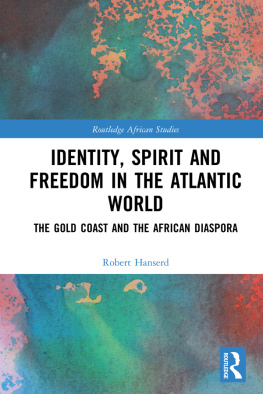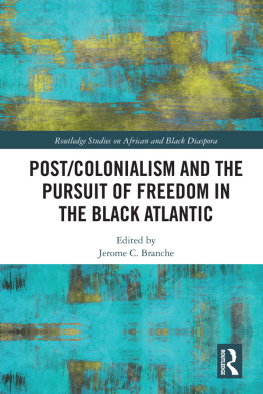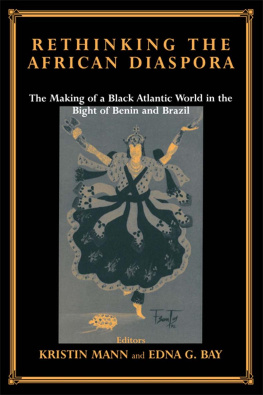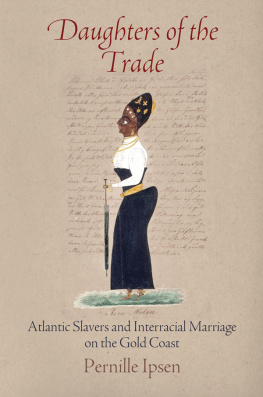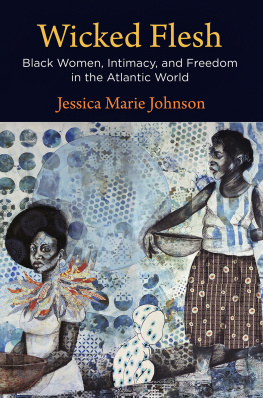Identity, Spirit and Freedom in the Atlantic World
This book applies oral, archival and other interdisciplinary evidence from West Africa and the Americas to analyses of new world Maroons, slaves and free blacks, examining a Gold Coast entrepot of Akan, Ga, Guan and other peoples in an Atlantic era of non-linear, mutable intersection of contested history and culture.
Combining extant evidence with newer interdisciplinary insights to reconsider under-recognized histories and actors, Identity, Spirit and Freedom in the Atlantic World explores West African cosmologies, regional statecraft and socio-cultural practice, and the way they contributed to Atlantic ideas of freedom, identity and spirituality. Archival researches of British, Dutch and Danish Atlantic thoroughfares bring to light histories of royals, priests and others remade as captive laborers, Maroons and free blacks. Looking at Akwamus overtaking of Great Accra, Jamaicas Maroon Wars, the 1712 Rebellion in New York and many other examples, this book explores the evolution of identity and spirituality in the diaspora of the Gold Coast and the Atlantic world.
Identity, Spirit and Freedom in the Atlantic World will be of interest to scholars and students of African studies, the African diaspora, cultural studies and Atlantic and American history.
Robert Hanserd is an Assistant Professor of Atlantic and African History at Columbia College, Chicago, USA.
Routledge African Studies
Africa in Black Liberal Activism
Malcolm X, Stokely Carmichael & Walter Rodney
Tunde Adeleke
Global Africans
Race, Ethnicity and Shifting Identities
Edited by Toyin Falola and Cacee Hoyer
The Socio-Cultural, Ethnic and Historic Foundations of Kenyas Electoral Violence
Democracy on Fire
Stephen M. Magu
African Philosophy and the Marginalization of Women
Edited by Jonathan O. Chimakonam and Louise du Toit
African Philosophical Currents
John Murungi
Gender and Human Development in Africa
Edited by Akinloy j, Ibigbolade S. Aderibigbe and Felisters Jepchirchir Kiprono
Reporting African Elections
Towards a Peace Journalism Approach
Joseph Adebayo
Identity, Spirit and Freedom in the Atlantic World
The Gold Coast and the African Diaspora
Robert Hanserd
For a full list of available titles please visit: www.routledge.com/African-Studies/book-series/AFRSTUD
Identity, Spirit and Freedom in the Atlantic World
The Gold Coast and the African Diaspora
Robert Hanserd
First published 2019
by Routledge
2 Park Square, Milton Park, Abingdon, Oxon OX14 4RN
and by Routledge
52 Vanderbilt Avenue, New York, NY 10017
Routledge is an imprint of the Taylor & Francis Group, an informa business
2020 Robert Hanserd
The right of Robert Hanserd to be identified as author of this work has been asserted by him in accordance with sections 77 and 78 of the Copyright, Designs and Patents Act 1988.
All rights reserved. No part of this book may be reprinted or reproduced or utilised in any form or by any electronic, mechanical, or other means, now known or hereafter invented, including photocopying and recording, or in any information storage or retrieval system, without permission in writing from the publishers.
Trademark notice: Product or corporate names may be trademarks or registered trademarks, and are used only for identification and explanation without intent to infringe.
British Library Cataloguing-in-Publication Data
A catalogue record for this book is available from the British Library
Library of Congress Cataloging-in-Publication Data
Names: Hanserd, Robert, author.
Title: Identity, spirit and freedom in the Atlantic world : the Gold Coast and the African diaspora / Robert Hanserd.
Other titles: Routledge African studies; 31.
Description: New York : Routledge, 2019. | Series: Routledge African studies; 31 | Includes bibliographical references and index.
Identifiers: LCCN 2019007123 | ISBN 9781138104099 (hardback) | ISBN 9781315102344 (ebook) | ISBN 9781351591775 (epub) | ISBN 9781351591768 (mobipocket)
Subjects: LCSH: AfricansRace identityAmericaHistory. | AfricansAmericaEthnic identityHistory. | AfricansAmericaReligionHistory. | AmericaCivilizationAfrican influences. | GhanaPolitics and governmentHistory. | African diaspora.
Classification: LCC E29.N3 H36 2019 | DDC 305.896/073dc23
LC record available at https://lccn.loc.gov/2019007123
ISBN: 978-1-138-10409-9 (hbk)
ISBN: 978-1-315-10234-4 (ebk)
Typeset in Times New Roman
by Apex CoVantage, LLC
For Beverly Zora and Valerie
Contents
Thank you to everyone including family, friends and colleagues who assisted me in this endeavor. Special thank you to the court of Osabarima Opese Konadu II in Awukugua, Akuapem, Kwame Bekoe and the Akyem Abuakwa stool in Akuropon, Akuapem, Nana Y. Larbi, Historian, Nana Addo Kwabi, General Secretary, Nana K. Ofei, Head of Family and Osofo K. Dompreh, Chief Priest of the Okomfo Anokye Shrine, Awukugua, Akuapem. Kofi Bempong, Daniel Nana Addo, One Africa, Nana Abass, Aaron Fogleman, Ismael Montana, Sundiata Djata, Kwame Essien, Harry Odmatten, Kwasi Konadu, Christopher DeCourse, Ray Kea, E. Kofi Agorsah, Ken Bilby, Brian Corr, Presbyterian University College- Akuapem, Columbia College Chicago, villages and communities of Awukugua, Akuropon, and Sunyani.
Freedom is a relative term. Kyerepon-Guan oral traditions recalled kmfo Anokye, the famed spirit priest, held off Akwamu Awarufram armies known as the masters of firepower intent on destruction of his village Awukugua and the capture and sale of the residents of Kyerepon Amannuonum to Europeans at the coast. What perceptions of freedom are expressible in this account? Ideations of liberty influenced the name Akua-pem, a mix of Akan, Guan, Ga and Adangbe and other groups in the eastern region referred to as the Gold Coast. These groups initiated the Concord at Abotakyi and participated in the Nyanoase War of 17291730 that reorganized the eastern Gold Coast interior under an Akyem stool in 1733. In the Blue Mountains of Jamaica, what was freedom to Grandy Nanny and her Windward Maroons, who deployed elements of Gold Coast identities and spiritualities for ambuscade and to aim bullets and flaming projectiles at English militias, free black and slave black-shots intent on their capture and enslavement? Kojo and his Leeward Maroons in the Cockpit Country fought British colonists for a treaty that secured their autonomy but obliged Maroons to capture fugitive slaves, their former allies. What was its value to Koromantee and Mina American-made Gold Coast and Akan identities, in the colony of New York in 1712 and 1741, where slaves and free blacks from varying West and Central African cultural centers along with whites enacted conspiracy and real resistance to slavery via Akan and other African forms of spirituality? How or to what extent did Gold Coast diasporas influence Maroons, free blacks and slaves and their struggles for liberty in North America and the Caribbean prior to and during the Afro-Atlantic age of Revolutions and Emancipation?
This book investigates freedom, spirituality and identity in West African Akan, Guan, Ga, Adangbe and other late seventeenth- to early nineteenth-century culture and history. Maroons, slaves and free blacks articulated elements of these West African beliefs and practices in Jamaica, New York and other Atlantic thoroughfares. Within chronological and cultural parameters of a Gold Coast diaspora, African lifeways converged with Enlightenment philosophies of freedom and religious view on liberty. This historicity shaped perceptions of personhood and ideations of liberty, cosmology and identity in Atlantic Worlds. Many researchers downplayed the African cultural transfer to the Americas in this process. This book uses West African culture and history as a lens to consider African and Afro-Atlantic perceptions on freedom, identity and spirituality. The manuscript includes oral, archival and other interdisciplinary evidence from West Africa and the Americas in its analysis of new world Maroons, slaves and free blacks. It highlights a Gold Coast entrepot of Akan, Ga, Guan and other peoples in an era of Atlantic cultural transfer. West African cosmologies, regional statecraft and socio-cultural practice were eviscerated and reinvented in Atlantic ideations of freedom, identity and spirituality.

